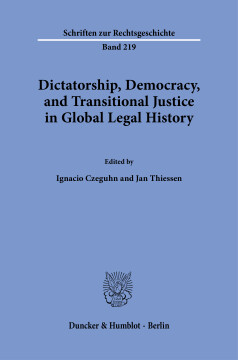Dictatorship, Democracy, and Transitional Justice in Global Legal History

BOOK
Cite BOOK
Style
Format
Dictatorship, Democracy, and Transitional Justice in Global Legal History
Editors: Czeguhn, Ignacio | Thiessen, Jan
Schriften zur Rechtsgeschichte, Vol. 219
(2023)
Additional Information
Book Details
About The Author
Ignacio Czeguhn studierte Jura in Würzburg, wo er ebenfalls promovierte und habilitierte. Er ist Lehrstuhlinhaber an der Freien Universität Berlin für Bürgerliches Recht, Europäische und Deutsche Rechtsgeschichte sowie vergleichende Rechtsgeschichte, Mitglied im wissenschaftlichen Beirat der Gesellschaft für Reichskammergerichtsforschung, Mitglied der königlichen Akademie für Recht und Jurisprudenz in Granada und Träger der Georges-Sarton Medaille der Juristischen Fakultät der Universität Gent (2017). Korrespondierendes Mitglied der Sächsischen Akademie der Wissenschaften zu Leipzig.Jan Thiessen studierte Jura an der Humboldt-Universität zu Berlin, an der er auch provomiert wurde und sich habilitierte. Von 2010 bis 2017 war er Inhaber des Lehrstuhls für Bürgerliches Recht, Deutsche Rechtsgeschichte und Juristische Zeitgeschichte, Handels- und Gesellschaftsrecht an der Eberhard-Karls-Universität Tübingen. Seit 2017 ist er Inhaber des Lehrstuhls für Bürgerliches Recht, Juristische Zeitgeschichte und Wirtschaftsrechtsgeschichte an der Humboldt-Universität zu Berlin. Seit 2015 ist er Mitglied des Arbeitskreises Rechtswissenschaft und Zeitgeschichte an der Akademie der Wissenschaften und der Literatur Mainz.Abstract
The anthology presents the lectures given on the symposium »From Dictatorship to democracy« at the House of the Wannsee Conference on 13-14 September 2021. The aim of the organizers was to show what problems existed during the transition from dictatorship to democracy in several countries around the world. They all enacted laws or other measures to ensure that fundamental rights and the rule of law would resist anti-democratic ideologies, anti-Semitism, racism, and war crimes in the future. However, the legal system and law in these countries themselves often had their origins in dictatorship. Thus, there were and are obvious and hidden anti-democratic continuities that influence law and the legal system up to the present. Scientifics and jurists from Italy, Japan, Poland, Spain, South Africa, and Germany examine these continuities in their contributions.The anthology presents the lectures given on the symposium »From Dictatorship to democracy« at the House of the Wannsee Conference on 13-14 September 2021. The aim of the organizers was to show what problems existed during the transition from dictatorship to democracy in several countries around the world. They all enacted laws or other measures to ensure that fundamental rights and the rule of law would resist anti-democratic ideologies, anti-Semitism, racism, and war crimes in the future. However, the legal system and law in these countries themselves often had their origins in dictatorship. Thus, there were and are obvious and hidden anti-democratic continuities that influence law and the legal system up to the present. Scientifics and jurists from Italy, Japan, Poland, Spain, South Africa, and Germany examine these continuities in their contributions.
Table of Contents
Chapters
Preface
In: Dictatorship, Democracy, and Transitional Justice in Global Legal History (2023), pp. 5–6
Table of Contents
In: Dictatorship, Democracy, and Transitional Justice in Global Legal History (2023), pp. 7–7
The Amnesty Measures of the Spanish Transition
In: Dictatorship, Democracy, and Transitional Justice in Global Legal History (2023), pp. 91–104
La transición a la democracia en los países de América Central
In: Dictatorship, Democracy, and Transitional Justice in Global Legal History (2023), pp. 125–152
From Apartheid to Democracy in South Africa
In: Dictatorship, Democracy, and Transitional Justice in Global Legal History (2023), pp. 153–176
Kontinuität, Tradierung und Transformation des Antisemitismus
In: Dictatorship, Democracy, and Transitional Justice in Global Legal History (2023), pp. 185–190
The Treatment of the Nazi Past in Contemporary German Legal Education
In: Dictatorship, Democracy, and Transitional Justice in Global Legal History (2023), pp. 191–208
Learning from History?
In: Dictatorship, Democracy, and Transitional Justice in Global Legal History (2023), pp. 207–211















